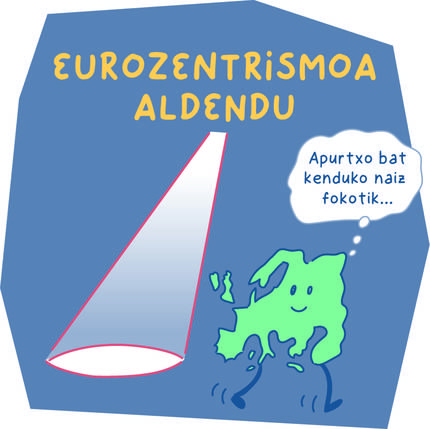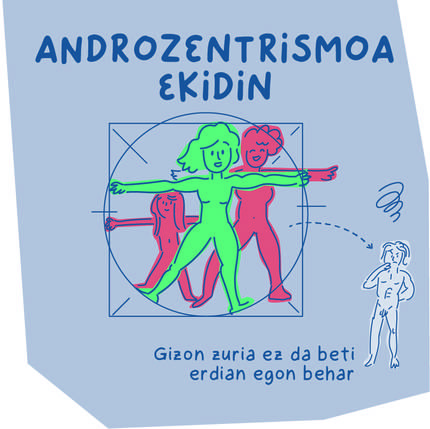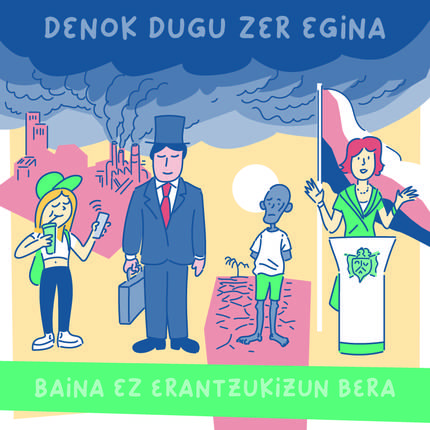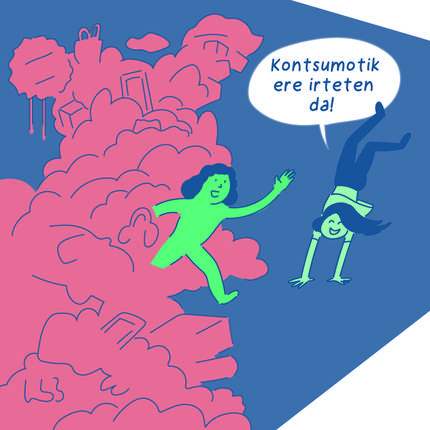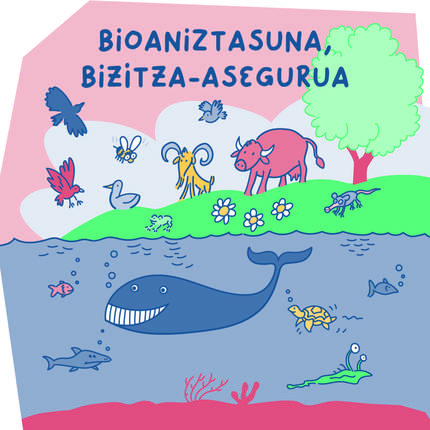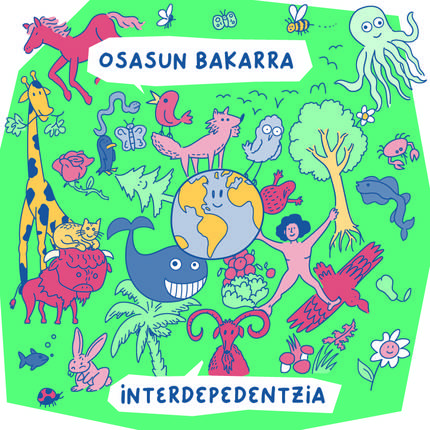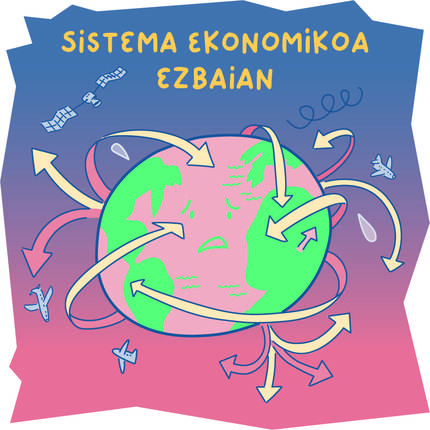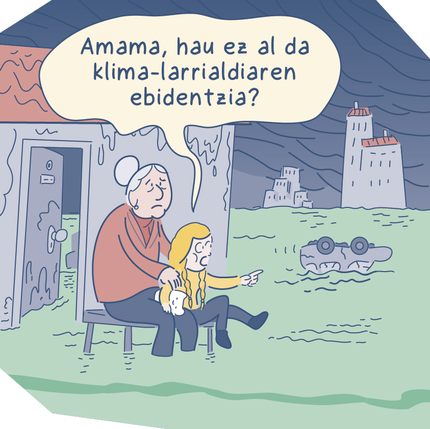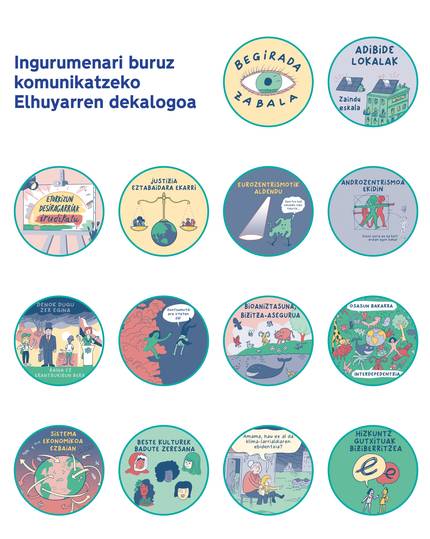Elhuyar Environmental Communication Decalogue
2023/06/07 Elhuyar Zientzia
We are facing an unprecedented environmental emergency, a global change. Climate emergency, loss of biodiversity, desertification, pollution and waste of natural resources are some of its symptoms. And there's no question of gravity anymore. According to the United Nations, 120,000 km2 of the land is converted each year into deserts. Consequently, 75 million children under the age of 5 are hungry and by 2020 30 million climate refugees had to leave their country.
It is not just an ecological crisis. Social, economic and health crises cross, feeding each other. We are therefore facing a complex eco-social crisis that requires deep social reflection.
Elhuyar works to build an active and critical society, and for this it is essential to socialize detailed information based on scientific evidence. After a process of collaboration between scientists, social, educational and scientific discoverers, Elhuyar has created a decalogue for environmental communication. The objective is responsible and socially effective communication. This decalogue aims to be a proposal for reflection on a subject as complex as the one that we are directly concerned with, the starting point of a long process. To download the decalogue click here.
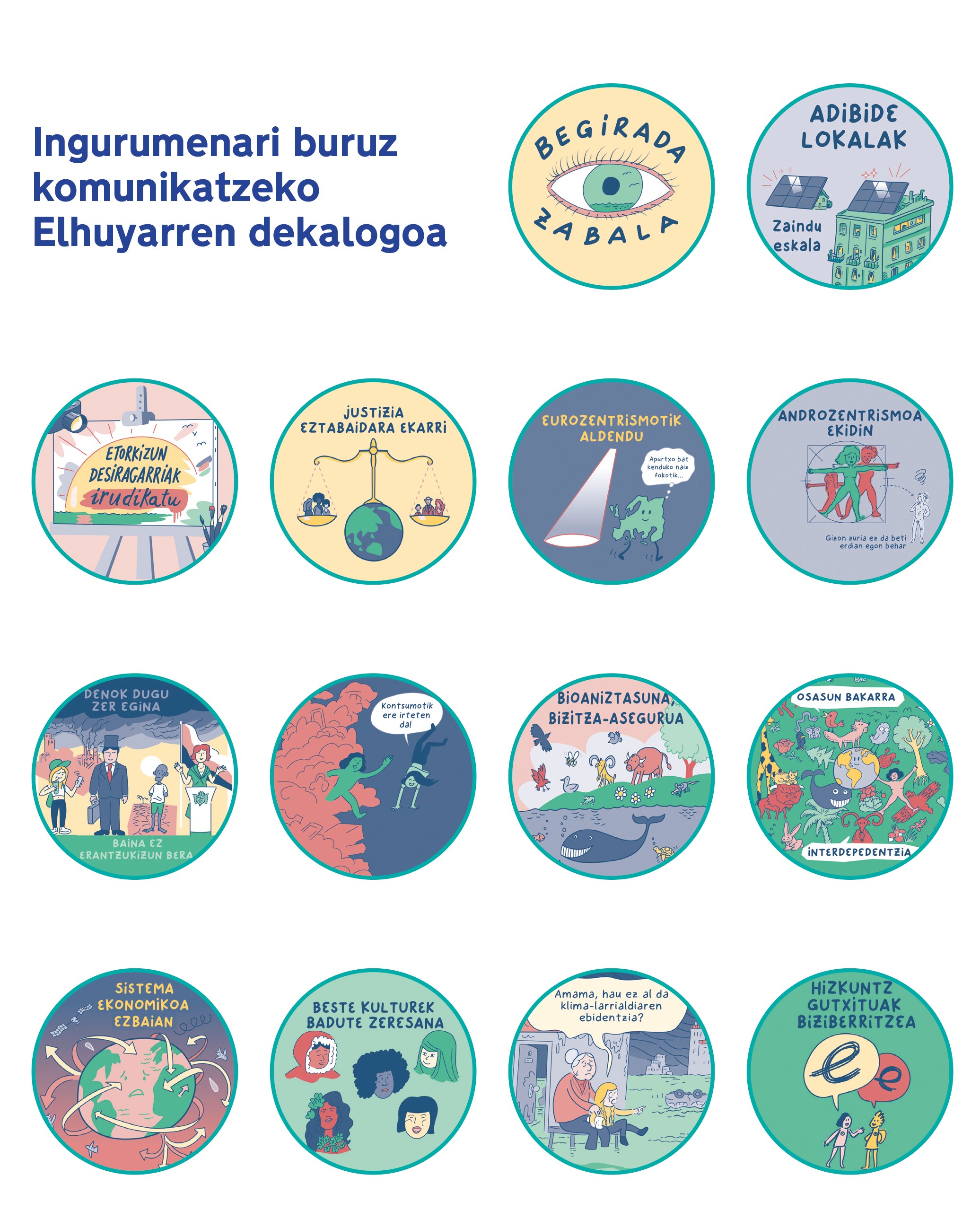
1.Integrar complementary views for the complexity of the system: health, equality, environment, social, economic, political, technological, philosophical, psychological, ecological, ethical… The diversity of origins and impacts of the emergency makes interdisciplinarity necessary.
2.Dar local examples of problems and solutions, but not losing the global scale perspective. The same questions have different answers depending on the scale. What serves for the local scale does not have to serve for the global scale and vice versa.
3. Don't be a catastrophist. Take advantage to imagine desirable futures. Account for the serious reality, but pay attention to possible solutions. The environmental emergency will force society to make changes, but it also has the potential for social transformation.
4th. Bring to debate the dimension of justice. There is a direct link between environmental crises and social injustices. Both have a common origin: abuse of power. Finding solutions will also require equitable distribution of resources.
5.AlLeave the Eurocentric narrative. Economics, health, technology and science have a very Eurocentric vision. And many of the solutions proposed to address the environmental emergency.
6. Avoid tight gazes such as androcentrism and anthropocentrism. Pay attention to whether environmental emergency communication incorporates the gender perspective or maintains the androcentric view as a universal gaze. The anthropocentric perspective also prevents understanding the functioning of nature.
7. We all have something to do, but not the same responsibility. Neither the countries of the Northern and Southern Hemispheres nor the authorities and citizens bear the same responsibility. Provide the data and request the corresponding level of responsibility.
8.La solution is social and political, not just technological. Technology is necessary, but it will never be enough to rule out the erosive behavior of humans on the planet. Watch out for narratives that avoid real debate about the potential of technology.
9.Transmitir the values of nature: regulation of life, well-being, care, responsibility, prosperity, custody of the territory… Distinguish three planes: instrumental values (biodiversity is the life insurance of the planet), intrinsic values (ecological) and relational values (human relations with nature).
10. Single Health: a quality environment is essential for a quality life. Each species has a specific function in the complex ecosystem network, so we are living interdependent, interdependent. Human health, animal health and environmental health are closely linked.
11.Cuestionar concepts rooted in our economic system: globalization, continuous economic growth, the need to increase the birth rate… Contribute to creating new imaginaries of well-being.
12.Dar the word to proposals from social movements. These include ecofeminism, youth movements and traditional local knowledge. Providing them with information based on scientific evidence is also a tool to make society an agent.
13.Proporcionar resources for a critical view and identify the ways denial takes: “There have always been changes in climate”, “there is no absolute consensus in science”, “green technologies are the solution to the climate emergency”, “there is no task”, “species disappearance is normal”…
14.Comunicarse in Basque to promote sustainability. Local minority languages capture the global knowledge of ancestors about nature and are therefore depositary of ecological memory. Now and here, Euskera is a useful tool to strengthen adherence to nature and become a sustainability agent.
To download the decalogue click here. And more broadly, each content below:
1. Integrate complementary looks as a complex system
The planet is facing a global decline: the climate emergency, loss of biodiversity, pollution, waste of natural resources, global social inequality and the care crisis are some of its symptoms. It is not just an environmental crisis, social, economic and health crises cross. We are facing a complex eco-social crisis.
Its diversity of origins and influences makes interdisciplinarity essential to understand the situation and seek solutions. All these views must be integrated into the communication of the environmental emergency: health, environment, economic, social, technological, philosophical, political, psychological, ecological, ethical…
Socio-economic, environmental, etc. interact with each other and this interaction accentuates the consequences. This is called syndemia because there is synergy between several epidemics. One example has been COVID-19, which combined the health, environmental and social crisis, according to the WHO. It was not enough to take only medical measures, but it was also essential to take social, economic, ecological and political measures. In the case of the environmental emergency, it must also be addressed from all of them.
Interdisciplinarity and transversality are not enough. The intersection perspective should also be included. When formulating proposals for action in an emergency, the following questions should be asked: To whom are the benefits directed? Who has proposed them? What do they propose for? Do they harm anyone?
Otherwise, it is possible that the solutions proposed are made from a power relationship, without taking into account the realities of people who do not give body to Western culture and vision, masculinity, heteronormativity, economic wealth and whiteness. Introduce an intersectional approach that ensures that these are proposals that leave no one behind: gender, ethnicity, social class, age, sexual orientation, disability and other social categories so that multiple discrimination does not occur.
2. Give local examples of problems and solutions, but not lose global scale vision
It is not easy to understand the extent of the consequences of the climate emergency if they occur remotely and do not suffer directly. It is difficult to gauge, for example, the famines that have caused droughts in Africa. Distant examples become abstract and it is more effective to use examples that one can feel closer to connecting with reality: examples that approach space to become aware of the gravity of the situation and that it is also a personal problem and a responsibility; and those that approach time to make us see that it is present and not the future. Therefore, use local and specific examples whenever possible.
However, when proposing solutions, it is important to be clear about the concept of scale. Because emergency has a planetary scale and all cultures, socio-economic situations and ecosystems must be taken into account in order for the solution to be effective. The same questions have different answers depending on the scale: the one that serves at local level does not have to serve at global level.
For example, what is proposed in Europe does not have to be useful in the Amazon, or the policies developed in the Basque Country itself, in the Northern Basque Country, either in the field of cultivation or in construction, do not have to be Bavarian in the South. Is what is being proposed from the point of view of town planning in rural areas also useful? Or does what is useful for the population of high socioeconomic level take into account the needs and realities of people of low socioeconomic status? Never lose sight of scale.
3. Don't be a catastrophist. Leverage to imagine desirable futures
Attention to the message. The situation is serious, but not irreversible. If a great pessimism is transmitted, it can be paralyzing for many people and can lead to eco-anxiety, while others, like in the face of death, may feel like taking advantage of the last few days and tending to spend more resources; at best, not imagining how the future will be can generate resistance to change. Excessive pessimism must therefore be avoided.
For effective communication, remember the following important keys: (1) nature has an enormous capacity for recovery, highlighting solutions (2).
That's right, solutions aren't comfortable and not hidden that will be uncomfortable. Perhaps acceptance of climate change requires grief, acceptance of the loss of existing privileges. Grief needs space, time and name.
On the contrary, the environmental emergency can also be seen as an engine of social change. It is an opportunity to review welfare and justice. Opportunity to reflect on the consequences of the economic system capitalista.Cada more and more scientists propose degrowth as a solution to face the global environmental emergency: to give up unlimited economic growth and change the production and consumption patterns of this society. They say it can improve sustainability and human well-being if you take a deep thought. It would allow an equitable global distribution of resources and quality of life.
When talking about deceleration, expressly differentiate degrowth as synonymous with degeneration or decadence (energy, material or economic), and Degrowth as social movement and political proposal. In fact, in the face of the crisis and conflict that would be the first, the second proposes that this decrease be made in a controlled and democratically planned way, so that it is fair on a global level. It would require a reduction in the global north so far privileged so that other human groups can grow. However, the way to name the concept of growth is still under discussion.
Bring dimension 4.Justiziaren to debate
There is a direct link between environmental crises and social injustices. Sometimes it is difficult to see, but both have the same origin: the abuse of poder.Son indirectly caused by conflicts in the socio-economic and geopolitical spheres. And the consequences of these conflicts, besides the planet, are affected by the oppression of powerful countries; poverty; gender gap; exclusions by racial, cultural and religious identity; deficiencies in educational, health and food systems…
Therefore, addressing the environmental emergency inevitably requires eradicating the socio-economic and political causes that have caused it and introducing a culture of peace. Recognizing that peace is not the absence of conflict, but injustice.
There are many injustices that emerge in the climate emergency. Among others, the conflict between rich and poor countries. The countries of the northern hemisphere control the natural resources of others and, consequently, impoverished countries have a conditioned future. They cannot manage their riches to develop them as they would like, either economically or socially. Similarly, the responsibility of these countries enriched in climate change is causing the South to suffer harshly its consequences, but now the global North has financial and technological resources to take action in response to the climate emergency.
The dimension of justice is also evident in the Basque country itself, among other things in the field of energy. When communicating the creation of a wind farm, there are many doubts and concerns: having a great visual and ecological impact, where to put it? Does the decision to install windmills have an effective policy of reducing energy consumption? Or are they simply set up in order to increase the capacity to generate and consume energy?
On the other hand, the environmental emergency reveals another dimension of justice: intergenerational justice. Future generations have the right to live on a healthy planet.
Therefore, in formulating solutions it is necessary to analyse all these dimensions of justice, always with two clearly differentiated planes: ethical (not negotiable because there are fundamental rights at stake) and instrumental (useful for the solution but negotiable).
5. Move away from the Eurocentric narrative
The science we deploy is mostly Eurocentrist. It often disregards many and varied realities of the world; the issues it raises are not significant for three-quarters of the world. Western science is therefore not a universal science.
The Eurocentric vision is rooted: the European projects that are funded are aligned with political interests; their scientific questions and the interpretation of the world are Eurocentrists. As communicators, it is important to identify these Eurocentric narratives and not turn them into their speakers. And to point out the injustices of many of them.
For example, for the green economy to make sense, it needs to be small-scale. Its implementation on a global scale is not sustainable. Giving up a Eurocentric vision means taking into account other cultures and opinions of the world, both in identifying problems and in proposing solutions. Pay attention to the fact that the discourse being disseminated does not perpetuate the structural social injustices on which the environmental emergency is based. It can, among other things, justify green colonialism. When deciding to protect 30 per cent of the Earth ' s surface, for example, it is important to bear in mind that protecting does not have to imply the expulsion of indigenous people from the Earth, which would be to repeat historical injustices against them. On the contrary, we must opt for a model of protection that includes indigenous people, as it has been shown that their way of life is a guarantee of biodiversity conservation.
6. Avoid tight gazes such as androcentrism and anthropocentrism
Scientific evidence shows a clear correlation between climate change and gender. The consequences of the emergency are particularly severe for poor women and girls, older women, LGBTIQ+ people, people with functional diversity, migrant women and residents in rural areas. If they are invisible in normal situations, especially in emergency situations.
Research and climate policies should incorporate a gender perspective that takes into account the vulnerability of women in the androcentric system. If we keep the male gaze as a universal gaze, the characteristics and needs of women and other vulnerable groups will remain invisible.
For the eco-social transition to be effective, women must be at the centre, becoming active agents of change and focusing the debate. Incorporating the perspective of complementary approaches is essential for better conservation of the environment, poverty reduction and achievement of the Sustainable Development Goals.
Moreover, sustainability also requires giving up the strict anthropocentric view of our species. Anthropocentrism is deeply rooted in our society: we are convinced that man is at the center of nature and that other living beings are at the service of it. This approach hinders the understanding of the functioning of nature, since the human being, far from being in the middle of nature, is only a gear of complex machinery.
In the complex network of ecosystems, each species has a function: some are pollinating, others break down matter, others create soil… And thanks to the contribution of all of them the system works. Understanding how ecosystems work is fundamental to internalize that living beings are interdependent, to see that humans depend on other species. Therefore, the dissemination of scientific knowledge of ecology can help dismantle the anthropocentrism of Western society and lead to a true effective eco-social transition.
7. We all have something to do, but not the same responsibility.
It is up to us all to get involved in the social changes required by the environmental emergency. But the authorities, the employers and the simple citizens do not have the same responsibility. Not the same possibility and ability to offer solutions. Make the level of responsibility visible and not attribute responsibilities to citizens.
Neither do the countries of the Northern and Southern hemispheres bear the same responsibility. Scientific reports revealed that the countries of the northern hemisphere are responsible for 92% of the climate emergency. The global map of excessive emissions and the global map of climate vulnerability are almost exact investments between them. To hold all countries accountable at the same level in seeking solutions would only increase the dimension of injustice.
8. The solution is social and political, not just technological.
Technological solutions to deal with the climate emergency are often proposed: wind farms, electric cars, carbon absorption technologies, gigantic marine wind turbines, satellites to monitor the emission of gases… Cleaner technology and renewable energies need to be designed. But changing production technologies will never be enough to cope with the enormous energy expenditure generated by our economic system and compensate for the greenhouse gases it generates.
Technology itself does not have the capacity to respond to the scale of the challenge of the planet. Because the problem is not just technological, and therefore not the solution. Although technology can help, scientific evidence indicates that it is not enough to cope with the environmental emergency, as it does not solve the problem on which it is based.
The problems arising from the current economic system are to a large extent the ones that have caused the climate emergency, so solutions must also be political, economic and social. It implies, inter alia, a rethinking of the economic system, in which current consumption patterns, attitudes and dependency on constant economic development emerge. If not, the belief that technology will serve to solve problems creates excessive social hope that delays effective action against these basic problems.
On the other hand, when it comes to the contribution that technology can make, it is necessary to look at who that technology is today, what its consequences are and who improves their lives.
9. Transmitting values of nature: regulation of life, well-being, care, responsibility, prosperity, custody of the territory…
It is important to convey the value that nature offers to the human being as a whole, so that it does not remain in a purely economic perspective. Science distinguishes three planes:
Instrumental values. Nature, besides supplying nutrients, water and energy, regulates the general processes of life: climate, decomposition of matter, pollination, atmospheric cleaning... With all this, nature is the life insurance of the planet and of humanity, and more specifically biodiversity. It offers stability and security to our species. Therefore, as biodiversity is at risk, the survival of our species is also at stake.
Intrinsic values. Nature has its own ecological value and it is up to us to take care of it only because it exists. Moreover, we have a responsibility to keep what we use in good condition.
Relational values. Just as the relationships we have with other people feed us and satisfy us, they also feed us the relationships that connect us with nature. One of them is care. Providing and receiving care is important for a full life. Just like when we're cared for, when we care for other people, we get a benefit because we feel good. It's a two-way relationship also in the case of nature. Indigenous peoples have it very internalized: If you take care of Mother Earth, Mother Earth will give you well-being back. In the past, in the northern hemisphere we also had very internalized that.
On the other hand, we are also pleased with the prosperity of nature: seeing that in spring plants germinate and flourish, feeling life everywhere, harvesting and feeling the generality of nature reinforces us.
More and more scientific evidence shows that the relationship with nature is essential for physical and mental health, and that, as the relationship is lost, the diseases we develop as species increase. Science begins to perceive that the disconnection of Western society with nature produces a loss of well-being. Psychological problems appear: depression and other psychological disorders.
But there is another strong relationship value: the custody of the territory. It is up to us to give up the territory given by the ancestors to the next in good condition.
10. Single Health: a quality environment is essential for a quality life
Each species has a specific function in the complex ecosystem network, so living beings are totally interdependent. Dependence on human health, animal health and environmental health, for example, is constantly being highlighted. When one is not healthy, others also suffer the consequences. This is the idea conveyed by the concept of Single Health, proposed by the World Health Organization. The dissemination of this concept can help society assume the idea of interdependence and internalize biodiversity as a life insurance of the planet.
However, the concept of Single Health is frequently used in an anthropocentric manner, with the sole objective of guaranteeing human health. Scientists demand the need to move away from these discourses and introduce environmental ethics into the concept. In fact, the concept of Single Health encompasses a series of inseparable ideas:
On the one hand, it requires the consideration of health as a universal good. Health is not an exclusive right of human beings, but also of other species, ecosystems and future generations. Public health focuses on the health of human populations, while Single Health seeks a fair distribution of health among people, animals, plants and the environment. That is, the eco-social balance.
On the other hand, it demands sociopolitical and multicultural equity: all people have the same rights and opportunities. Single Health doesn't make sense if it's not firmly committed to the communities and voices that are left out.
11. Questioning concepts rooted in our economic system
To question the economic system and the concepts rooted in it: globalization, continuous economic growth, the need for an increase in the birth rate… Globalization has led society to believe that it is a natural tendency characteristic of society, but it responds to purely economic interests and has consequences for the environment. There are many reasons why we need to summarise economic circuits: environmental, economic and social, but also democratic. When economic circuits are too large, citizens cannot understand them, so they lose their capacity to influence and their control and decision is left to the elite, generating injustices. For citizens to be able to influence, a closer economy is needed.
Going deeper into the debate: Is it necessary to grow into gross domestic product to live well? What is real well-being? The best solution to maintaining the pension system is to have more children when the planet is overpopulated? Questioning existing beliefs can help activate the social changes required by the environmental emergency.
Science and science communication can help imagine how the transition of lifestyles can be and identify the benefits of change in health and well-being. Well-being is understood very differently according to culture, age, age. Therefore, a rethinking of well-being can help visualize the consumerist view of well-being and redefine well-being. What's really important?
According to human science researchers, human well-being demands equity and satisfaction of basic needs, but has nothing to do with the accumulation of wealth. Social relationships, being in nature, the possibility of education, satisfaction with life, the balance between work and personal life, commitment to society -- satisfy more. The transmission of this message and the identification of health assets can contribute to alleviate the social impact of the need for disability, reduce socioeconomic inequalities and facilitate social change.
12. Give voice to proposals from social movements
As politicians are not meeting the commitments signed at international level, it is important that society press. There are two effective tools to make society an active agent: on the one hand, to value the work performed by social movements and to make their achievements visible; and on the other hand, to provide resources to have information based on scientific evidence.
In the environmental emergency there is something to do with social movements that move away from the hegemonic imaginaries of capitalism and represent other desirable futures for society.
Ecofeminism, for example, focuses on the way in which the capitalist and patriarchal system relates to nature, as it sees a direct relationship between the exploitation of the planet and the historical domination of women and other marginalized groups. It calls for a review of concepts such as economy, production, development and work to make them ecologically and socially sustainable. It proposes to equate caring for the planet with caring for life and can make an interesting contribution to the problem of environmental emergency.
On the other hand, experts predict that youth climate activism may be one of the largest global movements in history. It is therefore important to make young people problematic so that they can highlight the problems they see. Keep in mind that, if this continues, young people born in 2010 will suffer the serious consequences of the climate emergency when they are older, according to the Intergovernmental Panel on Climate Change (IPCC).
13. Provide resources for a critical view and identify the forms of negationism
The debate must bring input and data from science to put the problem in place and propose solutions. Not to make decisions based on sensations and prejudices, but on data and research.
The responsibility of scientific journalism is to provide society with resources to develop critical thinking. In addition to the awareness of epistemic imbalance, Elhuyar's decalogue for the development of Critical Thinking can serve to obtain complete information, to self-evaluate its attitude and identify negationist fallacies and attitudes. It should also be borne in mind that many organisations also use green laundering to improve their image through fraud.
Although some types of negationism are obvious, others are less easy to identify: “There have always been changes in climate”, “there is no absolute consensus in science”, “green technologies are the solution to the climate emergency” (technological positivism), “there is no task” (climate pessimism), “species disappearance is normal”…
Sometimes reality is uncomfortable, and humans tend to deny it. Then there are negative movements among those who do not want to accept reality. It is not always easy to identify deniers. Attention, for example, to those who accept climate change but are not prepared to take the necessary action. Or, instead of generating less CO2, with those who only propose CO2 absorption technologies. It is also a form of negationism to propose technological solutions to deal with the climate emergency. Because with the excuse of the great potential of technology, these kinds of speeches prevent real debate.
Often, the ones that have the most economic interest are the ones that speak the most. Therefore, watch out for what we deploy. Any opinion is invalid. Scientists have been collecting data for decades. Base the arguments on scientific evidence and the opinion of the scientific community and give the floor to the experts.
However, there are also great power imbalances in knowledge: we are still legitimizing certain areas of knowledge of science more than others. From this imbalance of knowledge power, one cannot respond to this complex crisis. Collaboration between all areas of knowledge is essential.
Moreover, knowledge is not just in academia. A complete ecosystem of knowledge must be defined so that the traditional knowledge acquired by man over the centuries is not ignored.
14. Communicating in Basque to promote sustainability
Another crisis that crosses with the environmental emergency is the global loss of linguistic diversity. According to UNESCO, 50% of the world’s languages are about to be lost. Researchers are increasingly convinced that linguistic emergency and climate emergency are interconnected crisis situations. To the extent that the overexploitation of nature and social injustices have many common elements, colonization and historical abuse of power suffered by many languages is also in the same context.
However, science has shown that minority languages are a valuable tool to act against the environmental emergency. In fact, languages are a reflection of the relationship between individuals and cultures with nature, and in fact, many historically minority linguistic communities remain deeply rooted in nature. Nature care is internalized and its languages have a detailed knowledge of nature, which the ancestors have accumulated over the centuries evolving with nature. They are deposits of ecological memory and therefore valuable tools for sustainability.
Euskera also has a rich vocabulary related to nature, which helps to know and understand the nature of the country. Bearing in mind that the human being maintains a strong attachment to the landscape and the mother tongue of its surroundings, until it is part of its own identity, the Basque Country is a valuable tool for transmitting ecological knowledge, strengthening the adhesion to nature and making the Basque community a sustainability agent.
Project promoted and financed by the Department of Economic Promotion, Tourism and Rural Environment of the Provincial Council of Gipuzkoa.
However, many of the world ' s minority languages are on the verge of being lost by unresolved abuses and by ecological agents interacting. Recognizing that cultural and linguistic diversity is a key element for the sustainable development of peoples, it is interesting to integrate the perspective of linguistic ecology. Linguistic ecology is the knowledge that studies the relationship between languages and environmental variables.
Building a development model based on equality and human values requires preserving linguistic diversity. By moving the principle of equality to languages, equality is not to treat languages in the same way in different situations, but to enable them to have the same opportunities. Equity and sustainability therefore come from the political, social, economic and legal protection of local cultures and languages.

Gai honi buruzko eduki gehiago
Elhuyarrek garatutako teknologia







